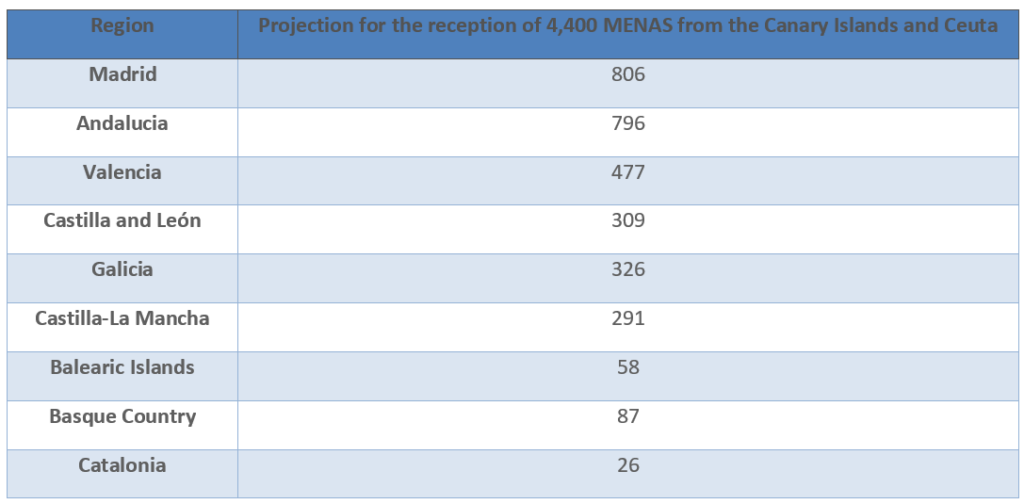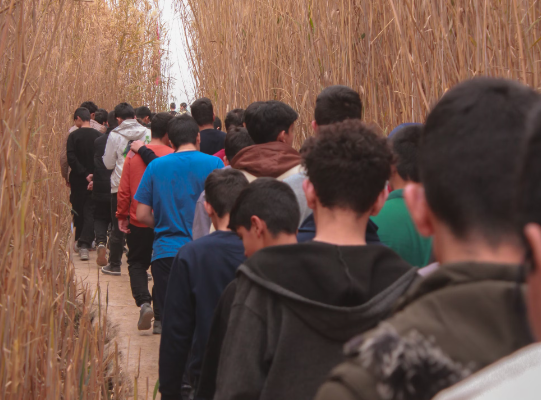
By: Natalia Pérez Mas, Account Executive and Social Media Manager.
.
March has marked a true revolution in Spanish immigration policy as we knew it. In recent weeks, the first legal steps have been taken, after nearly years of unproductive negotiations, to make the distribution of unaccompanied minors (MENAS) arriving in the Canary Islands, Ceuta, and Melilla across all Spanish regions a reality. Additionally, the transfer of immigration policy competences to Catalonia has been approved, allowing the independence party ‘Junts Per Catalunya’ to achieve one of its demands in exchange for supporting the fragile current central coalition Government, led by the Socialist Party.
Transfer of Immigration Competencies to Catalonia
The Socialist Party and the Catalan pro-independence party, ‘Junts Per Catalunya’, have agreed to register a Proposal for an Organic Law to delegate various state immigration competencies to Catalonia. This agreement lays out the foundation for ‘Junts’ to support the central coalition Government in various initiatives, such as the upcoming National Finance Bill or the temporary distribution of MENAS that has just been authorised. The draft law presented by both parties modifies the management of several concepts in immigration matters, such as:
- Border Control: the Catalan Police will manage the security of ports, airports, and critical areas in cooperation with other national law enforcement agencies. Additionally, the regional police will have the competency to prevent, prosecute, protect, and assist victims of human trafficking and exploitation. To this end, the Catalan police expect to increase the number of agents on duty.
- Returns: the regional government will manage the return of migrants who have been banned from entry. To do so, the Catalan Police will be present at the region’s borders, in coordination with the Civil Guard and the National Police.
- Sanctioning Competency: the region will exercise the sanctioning competency of administrative procedures related to immigration, so it will instruct and execute deportations that do not require a formal file (return). These deportations, will be carried out following the criteria established by the Security Board of Catalonia on immigration, which is also part of the agreement.
- Single Administrative Point: the region will serve as administrative center for long-term stay permits, temporary residence, and long-term residence, always complying with state regulations. It will also issue an identity documents for foreigners (NIE).
- Detention Centers for Foreigners: the regional government will have full responsibility for these centers. ‘Junts’ aims to call for a closure of the center in Barcelona which is the only one in the region.
- Hiring in Countries of Origin: the region will also determine, alongside businesses and unions, the profiles of workers to be hired in countries of origin.
Next steps
The law was accepted for processing by the Parliament’s Bureau in the middle of March, marking the first step in its parliamentary processing. If the law secures sufficient support from the parliamentary groups represented in the Parliament’, the parliamentary debate, in Committee con begin as early as mid-April and be approved between June and July. Additionally, regarding the upcoming steps for the law, the central Government recently stated that they have not ruled out further agreements with ‘Junts Per Catalunya’ in this area.
For now, the conservative parties in Parliament (People’s Party and Vox) are expected to vote against the bill, making the votes of the central coalition Government’s partners crucial. In fact, ‘Podemos’—communist party and former ally of the Socialist Party in the previous legislature—is not fully aligned with the draft law, and its votes will be key in determining the future of the legislation.
Agreement for the extraordinary Distribution of non-accompanied minors (MENAS) from overcrowded Spanish areas
The central Government has finally approved a Royal Decree-Law that will legally establish the possibility of redistributing MENAS from overcrowded areas such as the Canary Islands.
Specifically, the Royal Decree-Law aims to add a new article to the Law on Immigration, allowing the Sectorial Conference on Childhood to unanimously agree on the requirements to apply this mechanism and organise the redistribution of MENAS. Additionally, a fund will be created to compensate for the costs caused by overcrowding and/or the relocation of these minors, with an initial investment of 100 million euros in 2025. Regions will be required to have a minimum number of reception places (referred to as ordinary capacity) and, if applicable, prove that they are fully occupied in order to access the state fund.
At present, the redistribution of minors proposed from Ceuta and the Canary Islands will be activated through a “migration contingency” declaration, which will consider when a territory exceeds its ordinary reception capacity by three. According to the text, the relocation to other regions will be based on a set of criteria: population (50%), population dispersion (2%), per capita income (13%) and unemployment (15%). Other regional criteria are also included, such as the number of minors taken in over the last six months or the efforts made in recent years to support this group.
This very issue is currently the main point of contention among parliamentary groups, as regions like Catalonia and the Basque Country are expected to benefit from the distribution. Due to their already high numbers of hosted minors, both regions will take now fewer number of MENAs, at least according to the initial estimates for the upcoming allocation in the coming weeks. The conservative Partido Popular is particularly opposed to the fact that regions under its leadership will bear the greatest burden. Madrid and Andalusia are expected to receive around 800 minors each, making them the regions that will host the highest number of MENAs in the near future.
First re-distribution of MENAS
The first distribution of MENAS from the Canary Islands and Ceuta will take place in the first half of April. Prior to this, a Sectorial Conference on Childhood will be held, where the central Government will provide final details of the distribution. The Minister for Youth, Ms. Sira Rego, who will lead this Conference insisted that the regions must share their available data regarding the care of MENAS within the specified timeframe (before 31st March) in order to ensure a fair distribution among all involved.

Based on the aforementioned criteria, and considering that a redistribution of approximately 4,400 minors from the Canary Islands is expected, the previous table provides an estimate of how many minors can be accommodated across some of the main affected regions.
Recently, the Minister for Youth confirmed that her department is working on another Royal Decree, which will complement the previous one already approved, to establish a standardisation of the reception centers for MENAS across the country. According to the Minister, this future regulation will consider the possibility of implementing sanctioning mechanisms in case of non-compliance or irregularities in the management of the centers, as well as setting out minimum conditions for the reception system for MENAS throughout the country. There are also plans to establish minimum thresholds for the number of workers and minors in these centers.
Next Steps
As reported in the last few hours, the Interministerial Committee on Immigration of the central Government, chaired by the Minister for Territorial Policy and lead negotiator in the recent talks on the distribution of MENAs across the country, Mr. Ángel Víctor Torres, has approved the creation of a working group to oversee and coordinate the implementation of the aforementioned Royal Decree-Law.
This group, chaired by the Minister of Youth, will be responsible for coordinating efforts based primarily on the collection of data from all regions regarding reception resources, capacity, and occupancy rates for beds designated for minors. It will also include representatives from several other ministries, including Foreign Affairs, Interior, Inclusion, and Justice, among others.
.
For more information, join our social media profiles on X and LinkedIn.

